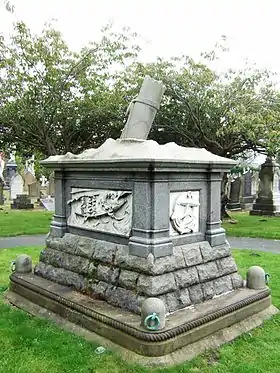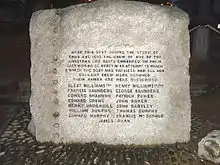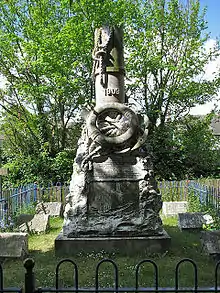
Many lives have been lost by lifeboat crews going to the aid of people and vessels in distress at sea and around the coasts of Britain and Ireland (UK, Republic of Ireland, Channel Islands and the Isle of Man), mainly but not exclusively in the service of the Royal National Lifeboat Institution (RNLI). More than 600 names are inscribed on the RNLI Memorial at RNLI HQ, Poole.[1] Some losses predate the RNLI (founded in 1824).
19th century
In the 19th century, lifeboats were almost exclusively oar and sail powered. Self-righting boats had been developed but were not yet widely adopted.
| British Isles lifeboat disasters in the 19th century | ||||
|---|---|---|---|---|
| Date | Lifeboat station | Lifeboat crew lost | Memorial | Brief details and references |
| 1810 | Hoylake | 8 | The men drowned when the lifeboat capsized in heavy seas while trying to aid the grounded ship Traveller. | |
| 1821 | Sandycove | 4 | The men drowned while the lifeboat was assisting the brig Ellen of Liverpool. | |
| 1824 | Great Yarmouth | 5 | On 23 November 1824 a boat was launched by eight Great Yarmouth beachmen in an attempt to rescue the crew of the stricken vessel Jessie. Whilst attempting to board the Jessie a heavy sea fell on board their boat which immediately sunk her and resulted in the loss of five of the crew.[2] | |
| 1833 | Appledore | 3 | Lifeboat 'Assistance' capsized on second approach to the brig Mary Ann. 3 men lost (Benjamin Pile, Samuel Blackmore and John Peake); 4 rescued from the sea by 2nd lifeboat 'Hope'. One man survived in the upturned boat, washed ashore an hour later. | |
| 1836 | Scarborough | 10 | Lifeboat turned over by exceptional sea; four of the 14 crew survived. | |
| 1841 | Blyth | 10 | On 28 October 1841, the lifeboat went to the assistance of the brig Sibsons and was capsized; two of the 12 crew survived.[3] | |
| 1845 | Great Yarmouth | 7 | The yawl Phoenix was wrecked whilst going to the assistance of the collier brig Ann with the loss of seven of the fifteen people on board. Survivors were rescued by the Caister Lifeboat.[4] | |
| 1859 | Aldeburgh | 3 | Lifeboat capsized in December with the loss of three of her 15 crew. | |
| 1861 | Scarborough | 2 | RNLI lifeboat Amelia wrecked on first service. Three members of the public who waded in also died, including Lord Charles Beauclerk. | |
| 1861 | Whitby | 12 | Lifeboat capsized after several rescues during a storm. Only one crewman survived, Henry Freeman. | |
| 1866 | Gorleston | 13 | On 13 January 1866 the private lifeboat, Rescuer, capsized in a storm with the loss of 12 of her crew.[5] A 13th fatality occurred when rescued crew member Robert Warner succumbed just days later as a direct result of the disaster.[6] | |
| 1867 | Gorleston | 6 |  | While returning to harbour after a rescue a fishing lugger collided with the private lifeboat, Rescuer. She capsized and 6 of her crew and 19 other people drowned.[5] |
| 1867 | Padstow | 5 | On the wall of St. Petroc's church, Padstow | Lifeboat capsized during a service to the Georgiana |
| 1871 | Whitby | 6 | RNLI lifeboat Harbinger lost in the Great Gale of 1871. | |
| 1874 | Stonehaven | 4 |  | Four of the crew of the lifeboat St George drowned while trying to enter Aberdeen Harbour after going to assist Grace Darling of Blyth, which foundered between Stonehaven and Aberdeen. |
| 1875 | Liverpool | 3 | 3 members of the Liverpool lifeboat crew and 9 crew and passengers from the Ellen Southard drowned after the lifeboat capsized | |
| 1877 | Aberystwyth | 1 | John James, a member of the crew, died from exhaustion after a long service to a Schooner on 20 February. | |
| 1880 | Wells-next-the-Sea | 11 |  | Wells lifeboat disaster[7] 11 of the 13 crew of RNLI lifeboat Eliza Adams were lost when she capsized after an abortive attempt to go to the aid of the brig Ocean Queen in heavy seas. The crew of the brig survived. |
| 1881 | Great Yarmouth | 6 | The lifeboat Abraham Thomas capsized on 18 January whilst attempting to rescue the mate of the schooner Guiding Star. The Abraham Thomas was struck by a heavy sea and lost six out of a crew of ten. The mate from the Guiding Star was also lost out of the lifeboat.[8] | |
| 1883 | The Mumbles | 4 | The lifeboat Wolverhampton was lost on service to the barque Admiral Prinz Adalbert of Danzig on 27 January; the tragedy was the inspiration for Clement Scott's poem The Women of Mumbles Head.[9] | |
| 1885 | Caister | 8 | The yawl Zephyr struck a sunken wreck on a distress call to a schooner on the Barber Sands. Eight of the 15 crew were lost. | |
| 1886 | Southport | 14 |  | 14 of the 16 crew of Southport's lifeboat Eliza Fernley, and the whole crew of St Anne's lifeboat (see below) died while trying to aid the barque Mexico in heavy seas. It remains the worst lifeboat loss in history. |
| 1886 | St. Annes | 13 |  | The crew of the St Anne's lifeboat Laura Janet, along with most of Southport's crew died in the same incident (see above). The crew of Mexico were rescued by Lytham's lifeboat. |
| 1888 | Gorleston | 4 |  | The Refuge was a private lifeboat belonging to the Gorleston boatmen. After going to the assistance of the steamer Akaba the Refuge was being towed back to port when the tow-rope parted and she was driven onshore where she capsized with the loss of four of her seven crew.[10] |
| 1889 | Portrush | 3 | Lifeboat The Robert and Agnes Blair went to the aid of the schooner Dryad and capsized off the coast off Portballintrae with the loss of three of the 13 crew. | |
| 1895 | Kingstown | 15 |  | Kingstown's (now Dún Laoghaire) lifeboat Civil Service No. 7 (ON 409) capsized while attempting to rescue the crew of the stricken Palme. All 15 crew died. |
| 1899 | Aldeburgh | 7 | The lifeboat Aldeburgh capsized with the loss of seven of the 18 crew. | |
20th century
During the 20th century many advances were made in safety and durability of lifeboats, including self-righting and motor power. Life jackets were continuously being improved.
| British Isles lifeboat disasters in the 20th century | ||||
|---|---|---|---|---|
| Date | Lifeboat station | Lifeboat crew lost | Memorial | Brief details and references |
| 1900 | Padstow | 8 | RNLB James Stevens No. 4 (ON 421) | |
| 1901 | Caister | 9 |  | RNLB Beauchamp (ON 327) capsized in heavy seas during the "Great Storm" of 1901. Asked why they had persisted in their rescue attempts the retired coxswain was reported as saying "Caister men never turn back". |
| 1903 | The Mumbles | 6 | RNLB James Stevens No. 12 (ON 436) capsized while aiding the grounded Waterford steamer Christina near Port Talbot harbour.[9] | |
| 1907 | Ryde | 2 | On 1 January, the lifeboat Selina capsized in a squall while searching for a missing sailor, throwing the crew into the sea. The survivors were washed ashore with the lifeboat at Southsea. | |
| 1908 | Newquay | 1 | RNLB James Stevens No 5 capsized. | |
| 1910 | St Davids | 3 | RNLB Gem (ON 59) was wrecked on The Bitches in Ramsey Sound near Ramsey Island. | |
| 1914 | Fethard | 9 | RNLB Helen Blake (ON 546) capsized and was totally wrecked on South Keeragh Island while going to the aid of the schooner Mexico. | |
| 1914 | Peterhead | 3 | RNLB Alexander Tulloch (ON 622), attempting to assist grounded Hull trawler Tom Tit in a storm, was wrecked.[11] | |
| 1915 | Bridlington | 1 | During a launch to the aid of the minesweeping trawler Lord Airedale (HMT No. 847), the carriage carrying the lifeboat collapsed, resulting in the death by drowning of horse driver Robert Carr. | |
| 1915 | Worthing | 1 | While going to the aid of the schooner Kingshill the lifeboat capsized in rough seas.[12][13] | |
| 1916 | Horton and Port Eynon | 3 |  | The lifeboat Janet, responding to a distress signal from the S.S. Dunvegan, capsized twice in rough seas. |
| 1916 | Salcombe | 13 | RNLB William and Emma (ON 524) capsized while going to the aid of the schooner Western Lass, ashore beyond Prawle Point. | |
| 1919 | Fraserburgh | 2 |  | RNLB Lady Rothes (ON 641) capsized while assisting H.M. Drifter Eminent.[14][15] |
| 1920 | Rhoscolyn | 5 | Crewmen lost in the attempt to rescue the crew of the SS Timbo in Caernarfon Bay | |
| 1928 | Rye Harbour | 17 |  | RNLB Mary Stanford (ON 661) capsized whilst coming into harbour after going to the aid of the Latvian steamer Alice of Riga. |
| 1939 | St Ives | 7 |  | RNLB John and Sara Eliza Styche (ON 743) capsized and self-righted three times, each time losing some of her crew. Only one crew member survived; the boat was wrecked. |
| 1939 | Cullercoats | 6 | RNLB Richard Silver Oliver (ON 794) was overwhelmed by a freak wave while training off Sharpness Point near Tynemouth Pier.[16] | |
| 1942 | Newburgh | 2 | ||
| 1947 | The Mumbles | 8 | RNLB Edward, Prince of Wales (ON 678) capsized while trying to assist SS Samtampa which had run aground and broken up at Sker Point during a storm. A total of 47 lives were lost.[17] | |
| 1951 | Scarborough | 1 | RNLB E.C.J.R. (ON 879). Whilst transferring from the casualty vessel to the lifeboat one crew member was trapped between the boats. | |
| 1952 | Bridlington | 1 | RNLB Tillie Morrison, Sheffield (ON 851) capsized. | |
| 1953 | Fraserburgh | 6 |  | RNLB John and Charles Kennedy (ON 790) capsized while escorting fishing vessels; one crew member survived. |
| 1953 | Arbroath | 6 | RNLB Robert Lindsay (ON 874) was sideswiped by a huge wave and flung on the rocks at Inchcape Park.[18][19] | |
| 1954 | Scarborough | 3 | RNLB E.C.J.R. (ON 879) capsized near the harbour mouth. | |
| 1959 | Broughty Ferry | 8 | RNLB Mona (ON 775) capsized with the loss of the whole crew while attempting to rescue the crew of the North Carr Lightship. | |
| 1962 | Seaham | 5 | .jpg.webp) | RNLB George Elmy (ON 873) capsized yards from the harbour entrance after being struck by a wave, with the loss of the whole crew and four of the five people they had rescued from the coble Economy.[20] |
| 1969 | Longhope | 8 |  | RNLB T.G.B. (ON 962) capsized in storm force seas when going to the aid of the Irene. |
| 1970 | Fraserburgh | 5 |  | RNLB Duchess of Kent (ON 908) capsized after being struck by a wave more than 30 ft high when assisting Danish fishing vessel Opal; one crew member survived. |
| 1977 | Kilmore Quay | 1 | Oakley-class lifeboat RNLB Lady Murphy (ON 997) launched to red flares but found nothing; on their return they capsized twice.[21] | |
| 1981 | Penlee | 8 |  | RNLB Solomon Browne (ON 954) was lost with all hands while assisting MV Union Star in a severe storm; the five crew and three passengers from Union Star also died. |
See also
References
- ↑ "The RNLI Heritage Trust preserves the history of the RNLI". Archived from the original on 5 May 2014. Retrieved 5 May 2014.
- ↑ see: The Norfolk Chronicle. 27 November 1824. p.3.
- ↑ "Blyth Lifeboat - Station History". Retrieved 9 October 2020.
- ↑ "Dreadful Shipwreck". The Times. No. 18834. London. 30 January 1845. col F, p. 3.
- 1 2 Higgins, David (1987). The Beachmen. Terence Dalton Limited. p. 49-51. ISBN 0-86138-047-9.
- ↑ see: "The Late Life-boat Accident: The Norfolk News" 27 January 1866
- ↑ Wells-next-the-Sea Lifeboats. Author: Nicholas Leach & Paul Russell. Published by:Tempus Publishing Ltd, 2006. Work: Chapter 1.The first lifeboats at Wells – 1869 to 1888, page 14, Lifeboat Eliza Adams. ISBN 0 7524 3875 1
- ↑ "Station history | RNLI".
- 1 2 "Mumbles Lifeboat - History". Retrieved 9 May 2014.
- ↑ see: "Lifeboat Disaster at Yarmouth: The Eastern Daily Press" 12 November 1888
- ↑ "Peterhead Lifeboat Station - Geddes Plaque". Retrieved 9 May 2014.
- ↑ Elleray, D.R. (1998). A Millennium Encyclopaedia of Worthing History. Optimus Books. p. 144. ISBN 0-9533132-0-4.
- ↑ Hare, Chris (1991). Historic Worthing: The Untold Story. The Windrush Press. p. 186-187. ISBN 0-900075-91-0.
- ↑ "Losses to Shipping and Property". The Times. No. 42086. London. 29 April 1919. p. 7.
- ↑ "Notable Dates in History". The Flag in the Wind. The Scots Independent. Archived from the original on 23 May 2014. Retrieved 23 May 2014.
- ↑ "Emotions run high at lifeboat memorial service". 23 April 2014. Retrieved 8 May 2014.
- ↑ Porch, Richard (2005). Swansea: History you can see. Tempus Publishing. Retrieved 8 May 2014.
- ↑ "Lifeboat disaster anniversary". Arbroath Herald. Retrieved 17 September 2013.
- ↑ "Service marks lifeboat deaths 60 years ago". HeraldScotland. 28 October 2013. Retrieved 8 May 2014.
- ↑ "Seaham Harbour Lifeboat (Loss)". Parliamentary Debates (Hansard). 20 November 1962. Retrieved 7 October 2016.
- ↑ "Kilmore-Quay Lifeboat - History". Retrieved 11 May 2014.